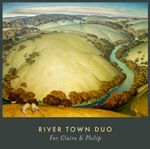|
Back
04/29/2021
“For Claire & Philip”
Caroline Shaw: For Claire & Philip
Whitney Ashe: The Circuitous Six
Derick Evans: On Lotusland
Hannah Lash: Leaves, Space
Evan Premo: Two Meditations on Poems of Mary Oliver
Stephen Andrew Taylor: Oxygen
River Town Duo: Philip Alejo (double bass), Claire Happel Ashe (harp)
Recording: Jeffrey Haskell Recording Studio, University of Arizona, Tucson, Arizona (September 2017 and May 2019) – 52’32
Furious Artisans 6824 – Booklet in English

   
I can’t say enough good things about For Claire & Philip, the debut album of the River Town Duo. The Duo—Philip Alejo, double bass, and Claire Happel Ashe, harp—commissioned works by six contemporary composers of unique personality and range of temperament, all projecting a distinctively rural American style. The result is an appealing chamber album featuring instruments one does not often hear in tandem.
The album kicks off with a sparkling four minutes with Caroline Shaw, the youngest winner of the Pulitzer Prize © for Music. In Shaw’s For Claire & Philip, Alejo immediately asserts a dramatic melodic line, advanced by the rhythmic chuckling of Ashe’s harp. The Duo’s delightful embrace of Shaw’s slip of an interlude catches our attention immediately and suggests adventurous listening to follow.
One of the delights of this album is the unexpected richness and emotional capacity of these two instruments: the variety of percussive effects, sweet melodies and sometimes aggressive bantering. There are dozens of effects, individually or together, that listeners may have never heard before. In 12 tracks, the listener is enchanted, lulled, shocked, and needled as two masters of their craft engage our attention with a full range of feelings, ideas and good humor.
Whitney Ashe’s The Circuitous Six reveals more intriguing techniques, percussive on the harp, at times sounding like a keyboard, as the composer shares the inspiration of the American desert. Derick Evans’ On Lotusland is far from the world that made Tennyson’s heroes mild-eyed and melancholy. There is a sharp attack by the bass and some guitar-ish iterations on the harp before we are buoyed by snapping, twanging strings and sparkling high notes giving a suggestion of flamenco before gliding into a lyrical duet.
Two six-minute movements by Hannah Lash celebrate the themes of Leaves, Space, specifically the organic process through which shoots and sprouts turn into leaves, and notes and beats intermingle to produce music. The “Space” movement sizzles with mystery, sometimes deliberately wobbly in the harp, other times tolling like a bell or chugging along like a locomotive in the bass.
I found Evan Premo’s Two Meditations on Poems of Mary Oliver particularly beautiful. The first movement, “Early Morning, New Hampshire”, offers a dreamy bass dawnscape, painted in pastel tones against the distant harp. “linen of words” (all lower case) twists and turns with a high bass tune and rhythmic murmuring on the strings. The work ends on a long, lingering tonic.
Most interesting intellectually was Stephen Andrew Taylor’s imaginative Oxygen. In this work in five movements, the composer behaves like a musical version of a medieval alchemist. While the latter would attempt to spin gross materials into gold, Taylor hopes to extract musical elements from data; in this selection, it means the chemical composition of oxygen and how it can be ignited and change shape in a purely musical setting. The work includes prepared harp strings to play the four letters of DNA. “(Ashe’s) graceful scales portray...the shape of the hemoglobin protein”, as the composer states in the booklet notes.
Overall, the album, For Claire & Philip, offers a fresh, innovative reassessment of two instruments we know and perhaps have taken for granted. The album is also a tasty sampler of some of the wonderful new music being composed in our time. At five minutes per track, even my restless humanities students, who opine that classical music is “just too long”, will have to ditch that excuse and enjoy some fine, concise listening.
Linda Holt
|